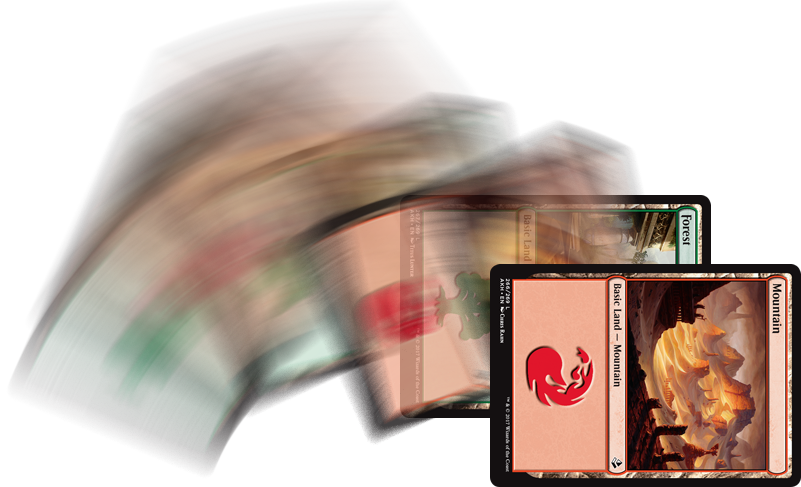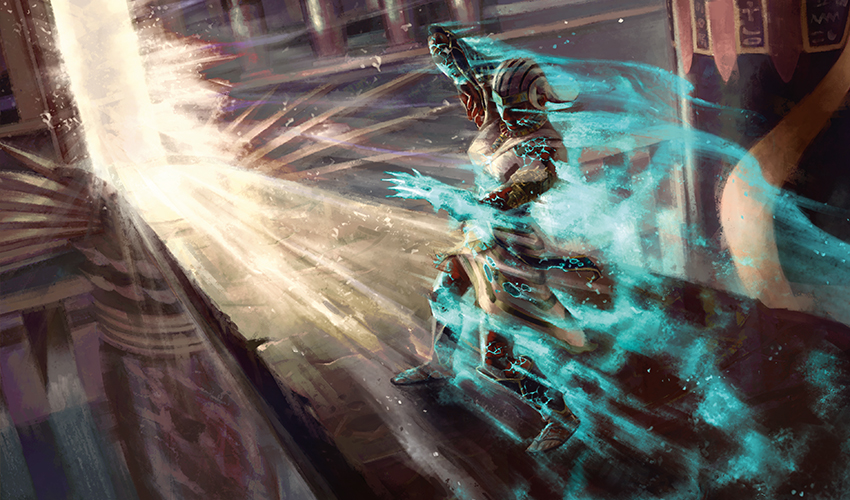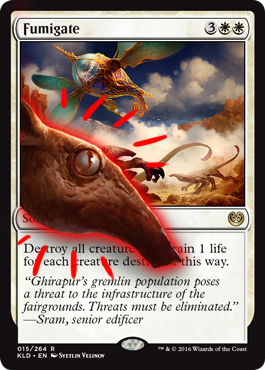Tap, Tap . . . Oops!
You do it in every game you play. You do it most turns of the game (hopefully), and sometimes even several times a turn.
What is it? Tapping your lands!

One of the first things that any player learns about Magic is that you tap your lands to cast your spells.
This idea is so fundamental to Magic, so core to gameplay, that it has become iconic throughout the gaming sphere. When I hear the word "tap" uttered, I instinctively turn around to see if Magic is being discussed. (Ironically, this has the same effect as someone tapping me on my shoulder.)
So, if in every game you play you're going to be tapping your lands to cast spells (some crazy older decks that don't use lands aside), you'd think a lot of focus would be put on doing it as optimally as possible. That makes sense, right?
And yet, often we throw caution to the wind, just twisting some illustrations of whatever our newest, most favorite hillside is and giving an ethereal shrug. Telling ourselves, "It probably won't matter."
And yet, it does.
Have you ever cast a spell and then slapped your forehead because you didn't leave the right color mana up for your combat trick?
Have you ever had a control deck opponent tap out of blue mana with cards still in their grip, giving you the sign that the floodgates are open to sneak past their countermagic?
Have you ever heard a freshly drawn card laugh at you from your hand after playing a card-drawing spell because you didn't leave the right mana up to cast it?
It. Matters.
Even if it only matters one in a hundred times you tap your lands, that's still pretty often considering how often you're going to be tapping them!
I see tapping mistakes happen all the time—and it's time to make the world a little better place and talk about how to avoid them. It's time to tap consciously instead of automatically.
There are three main layers to tapping properly. Let's get started!
1. What Might You Play?
The baseline thing to always do is to tap your lands to leave you with the widest array of colors and options.
For example, let's say you have two Forests, a Plains, and a Scattered Groves. You want to cast Glory-Bound Initiate.
If you were to tap to cast this, generally the best way is to tap your Plains and a Forest. That leaves you with access to both green and white mana.
Except for very specific instances, you should always tap single-color producing lands before dual lands. Dual lands just give you more options. This is a good hierarchy to practice doing: save dual lands for last.
Okay, simple enough. Now, let's try something else.
You have four Forests and five Islands—so nine lands in total. You're going to cast Mind from your graveyard and draw two cards, thanks to aftermath. What do you leave untapped?
This one is a little trickier. It's all about knowing what's in your deck!
How many two-color costs do you have? How many one-drops do you have that you'd want to be able to play along with something else? There might be a strong reason for leaving GGU untapped rather than UUG, entirely depending on your deck makeup.
2. What Does Your Opponent Think You're going to Play?
Even if you have nothing else to play or think it won't matter, how you tap your lands is going to matter a lot to any opponent paying attention.
In fact, I'd say that this is arguably more important than my first point. You always know what you have, and you'll hopefully tap it right most of the time. But your opponent doesn't know what you have—and looking at your lands is like looking through a foggy window into your hand.
Let's say you're playing a red-green aggressive deck in Standard, and you have two Mountains and two Forests. You tap three mana to cast a creature. Even if you have nothing left in your hand to cast, which mana you leave open makes a huge difference!
If you leave your Forest untapped, that signals to the opponent that you could have Blossoming Defense. On the other hand, if you leave your Mountain untapped, that signals that you could have Shock.
And, because we are naturally more likely to think about leaving mana up for what we have in our hands than what we don't, whichever card you choose to represent also gives off the signal that it's slightly less likely you have the other card.
Even though you actually have neither, this could greatly influence how your opponent spends their next turn. Perhaps they don't cast their removal spell because you could have the Defense, or make a different attack because of the risk of that Shock.
Which card would you rather have them be more afraid of? Which one leads them to make the play that's best for you? Representing that card is probably your answer.
And then, of course, there's a level deeper.

Let's look at a classic example. You're playing white-blue control deck with plenty of countermagic against an aggressive deck. You cast a spell on your turn, tapping out of blue mana.
Oh no! Your shields are down. Your opponent quickly picks up on this grievous error and unloads the creature they've been trying to sneak through. It looks bad for our hero!
. . . Except then you untap and happily cast a Fumigate to sweep the board.

It's a trick as old as Counterspell and Wrath of God themselves. You subtly lull your opponent into a false sense of security, then take advantage of it.
Now, you of course must be careful that you don't think they'll cast anything that will cause you massive problems even if you do Fumigate (for example, a planeswalker). But this kind of trick can be applied all over the place.
Let's go back to the red-green aggressive deck example for a moment. Except this time, you actually do have Blossoming Defense in your hand, along with a powerhouse four-drop creature you're planning to play next turn.
You're still casting that three-drop this turn because you want to wait a turn to play your four-drop and have Blossoming Defense for it. Having the Blossoming Defense in your hand would lead you to leave green untapped this turn.
But consider what happens if you signal you don't have Blossoming Defense by leaving the red untapped instead.
Perhaps next turn your opponent finds it unlikely you have Blossoming Defense, given how you tapped this turn, and casts a removal spell on your choice four-drop—and gets completely blown out. Or, maybe they spend a removal spell on your three-drop, which is okay since it chews through another kill card from their hand.
Now, this plan isn't without its risks. Maybe you end up really wanting access to that Blossoming Defense. But it's at least something to consider.
There's a lot more to mana tapping than what meets the eye.
3. What is your opponent going to play?
Finally, the last main layer of this is thinking about what your opponent might play and how that might make what lands you have untapped matter.
This one comes up less often than the others, but when it does, it can be absolutely backbreaking.
Let's say you're playing a match and following all this advice. You've kept a dual land untapped for your opponent's turn instead of a basic land to provide you with maximum options.
Then your opponent goes and plays a Wasteland.
They Wasteland your untapped dual land, and now you can't cast spells at all!
If you know your opponent's deck has a card like Wasteland or Blood Moon, you should mentally change your tapping hierarchy appropriately. Keeping a basic land untapped instead would solve this problem.
But it's not just getting your lands messed with to think about.
What if your opponent plays a card like Jace Beleren that draws you each a card? You'd want to have the right mana available to cast whatever you drew.
Keep in mind what's in your opponent's deck, and try to adjust accordingly.
Tapped Out
You'd be surprised how much power how you tap your lands can command—both for optimizing your spells and beguiling your opponents!
And what better place to try and practice these than the Prerelease this weekend? Go forth and apply some of these lessons as you face the tough Trials of Amonkhet! (You can find out more information on that by clicking here.)
Have any thoughts or comments? I'd love to hear from you! You can always reach me on Twitter, Tumblr, or by sending an email in English to BeyondBasicsMagic@gmail.com.
Have fun, and may you never find yourself tapped out of the color you need.
Talk with you again soon,

